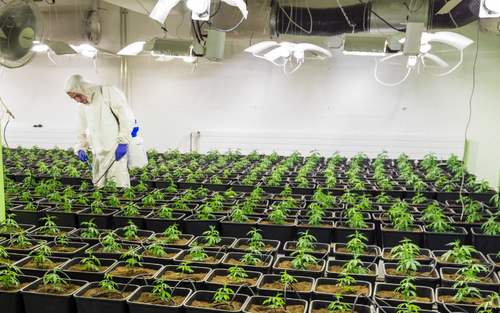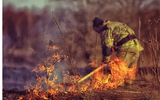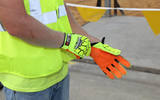Cannabis Gloves, PPE, and Safety
The growing cannabis industry will need more protections for the growing number of workers it employs. Chemical, biological, physical, and occupational hazards abound at all stages of the industry. This means employers should invest in head-to-toe protection for new workers on top of following all the necessary OSHA requirements to keep them safe.
Whether recreationally or medicinally, more and more states in the US are legalizing cannabis. This legalization has created more businesses and jobs within the growing cannabis industry, and more is to come as more states legalize cannabis use. Even if a worker isn’t in direct contact with the plants, all jobs within this new marketplace are integral to the industry. When hazards are present on the worksite, every worker needs and deserves the best protection as they perform their day-to-day responsibilities.
Like many industries and workplaces, the cannabis industry and the businesses within have workplace hazards that require protective clothing. PK Safety can provide the safety gloves and other personal protective equipment (PPE) that you and your workers need to stay safe on the job, no matter where in the cannabis cultivation industry you are.
Cannabis Industry Businesses and Risks
The cannabis industry includes many different businesses that employ different kinds of workers. These businesses include cultivation, distribution, laboratory testing, manufacturing, and retail. Each stage of the process has its rules, regulations, and roles, as well as workplace hazards. In general, though, cannabis industry workers will need protection from specific hazards in these categories, and it’s the responsibility of the employer to provide whatever protections are necessary for those workers.
- Chemical hazards: both from chemicals used in the care of the plants to atmospheric hazards. Pesticides, fertilizers, nutrients, carbon dioxide, carbon monoxide, disinfectants, and other corrosive or cleaning chemical agents. CBD production is a pretty involved process with several chemical and high-pressure-related hazards as well.
- Biological hazards: both respiratory and dermal. Exposure to THC, mold, sensitizers, and allergens are all possible.
- Physical and occupational hazards from equipment, tools, and structures on site: flammable and combustible liquids, compressed gasses, excessive UV light exposure, risks from walking or working surfaces, heavy equipment or machinery, confined spaces, working at heights, noise, electrical shocks, cuts, pinches, ergonomic injuries, sprains, and tools and equipment dangers.
In addition to those hazards, check the following OSHA industry regulations that might also apply to aspects of your cannabis business:
- Electrical hazards
- Airborne contaminants
- Flammable liquids and gasses
- Hazard communication
- Hazardous energy (lockout/tagout procedures)
- heat illness prevention
- injury and illness prevention
- machine hazards
- personal protective equipment
- point of operation hazards
- Pressure vessels
- Smoking in the workplace
- Repetitive motion injuries
- sanitation and pest control
- Slips, trips, falls, and use of ladders
Other regulations might apply, especially since laws are different in every state. We encourage you to look into resources to learn more or contact a safety expert for guidance.
Personal Protective Equipment (PPE)
Like in all industries, it’s the responsibility of the employer to perform all of the appropriate hazard assessments and supply necessary personal protective equipment (PPE) to keep workers as protected from workplace hazards as possible (OSHA 1910.32). This also means implementing other safety controls first—employers need to provide PPE, but it should be the last line of defense when it comes to hazard protection.
Not only do workers need workwear to protect themselves from the hazards listed above, but it’s also important for protecting the integrity of the plants. Some PPE can help avoid contaminating the plants at various points in the production and distribution process.
Again, the needs of employees will likely be different depending on what business within the cannabis industry they’re working in and the jobs they’re doing in that industry. Whether it’s a maintenance worker or someone working directly with the cannabis plants, there are broad categories of protective equipment that employers will likely need to supply for their workers.
Gloves: Hand protection is crucial at all levels of the industry, and there are different glove options available for different roles in the cannabis business. Cut-resistant gloves are essential for anyone handling sharp tools like knives, shears, scissors, and trimmers. Waterproof disposable gloves can be worn underneath cut-resistant gloves to protect those workers that need to stay dry while remaining protected from cuts. Integrated glove models are also available. Chemical-resistant gloves are essential for workers who are exposed to some chemicals, with variations in fit and material depending on the nature of the chemicals used. Heat-resistant gloves are also a great addition to anyone working in kitchens or around hot equipment.
Eye and face protection: From flying debris to dust, there are a lot of hazards in the cannabis industry that can hurt your eyes. Look into safety goggles and glasses, face shields, and other eyewear that’s impact-resistant, fog-resistant, UV resistant, and any other qualities needed for your job.
Respiratory protection: Some eye and face protection might include respirators or other protective measures that cover the mouth, which is important to prevent the inhalation of chemicals, allergens, dust, mold, and other airborne hazards. Outside of supplying respiratory PPE to workers, workplaces need to ventilate.
Cooling technology: Excessive time spent in hot, humid conditions can dehydrate and overheat you faster than you realize. In addition to taking breaks outside of a warm environment and having plenty of drinking water available, try cooling cloths, wide-brimmed hats, and sunscreen if you’re working outdoors.
Full body protection: Splashes and spills can become a big safety problem if the spilled liquid is a dangerous chemical. Garments rated for your industry’s work, like coveralls, overalls, and aprons, can keep splashes from getting through to a worker’s body. Arm protection from long-sleeved shirts or long gloves can protect not only against chemical splashes but also contact with hot surfaces and even protection from electrical hazards. Don’t forget proper footwear and shoe covers for the job.
Cannabis Safety PPE from PK Safety
From cultivars to processors and dispensaries, legal cannabis production has an ever-growing number of people involved, all of whom need to stay safe when they come to work for each shift. Like so many other industries, OSHA requires cannabis businesses to protect their employees from workplace hazards. Part of that protection comes down to providing the required PPE, especially if other hazard control options can’t be enacted. PK Safety has spent decades in the workplace safety business, which means we’ve seen a lot of changes in the workplace, as well as the gear that workers use. Cannabis may be a relatively new and growing industry, but it doesn’t mean we’re not prepared to help you meet the challenges you’ll face. For more information on the brands and cannabis safety products PK Safety carries, contact us online or by phone at 800.829.9580 to talk to one of our safety experts.
Recent Posts
-
Customizing Gas Detectors: Tailoring Solutions to Fit Your Unique Requirements
In today’s diverse industrial landscape, a one-size-fits-all approach to safety simply doesn’t cu …Jul 3rd 2024 -
10 Ways to Prevent Wildfires
You can prevent wildfires by extinguishing flames before you leave the worksite. Avoid practicing …Jul 1st 2024 -
ANSI/ISEA 138 Safety Gloves: Ensuring Hand Protection
The human hand is an anatomical masterpiece and arguably the greatest tool attached to our bodies …Jun 25th 2024





